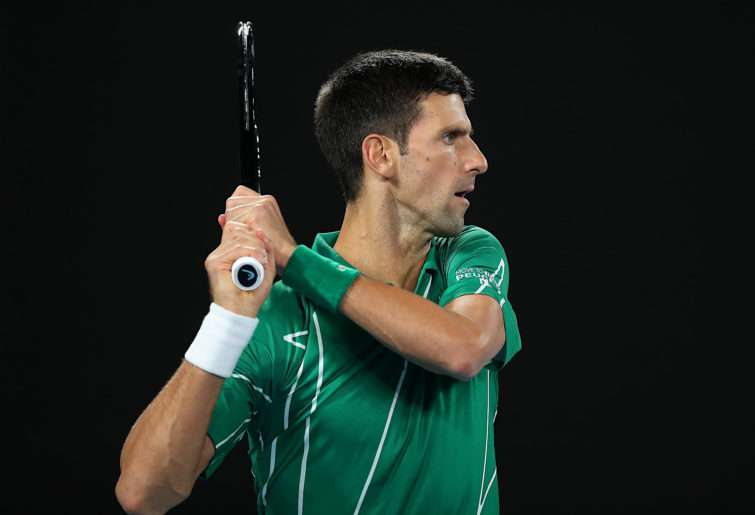JackJumpers' NBL title was special - but where does it sit among Tasmania’s top ten sporting moments?
It’s a pretty good time to be a Tasmanian sports fan right now. After years in the sporting wilderness with not much to celebrate,…
Opinion
There was a moment in the match where briefly, I counted Novak Djokovic out.
It was the start of the fourth set. Dominic Thiem had just dominated the third off a depleted looking Djokovic to take two sets to one lead. Fighting against a raucous crowd, unforced errors and an apparent injury, Djokovic was struggling.
At 1-1, 30-30, he hit an uncharacteristic forehand down the line error. The unflappable Djokovic suddenly looked flustered, Thiem tucked his shirt in, sniffed the air and walked to the baseline with purpose.
The crowd whistled and cheered as the camera panned towards a thoughtful Rod Laver staring at the scoreboard. This seemingly apt piece of videography signalled a changing of the guard, the start of the vaunted next generation of tennis players finally stepping up and toppling the insurmountable Big Three.
For most players, this sort deficit would be too much to topple. They would play hard but ultimately lose in a hard-fought, graceful contest, taking solace in the fact it was a respectable loss.
Novak Djokovic does not take solace in anything.
Novak Djokovic is not an ordinary player.
Nothing about Djokovic is ordinary or straight-forward. His life is well-chronicled. Born in Belgrade, Serbia, he was shaped by war. From queuing for essentials such as milk or bread to fleeing to bomb shelters in the middle of his tennis practice, Djokovic became a fighter.
He has said before that these experiences had allowed him to “simply stop hiding” and gain the indomitable spirit he is so renowned for.
But this is well-documented from both his childhood and career. His early career was defined by his precocious talent but inconsistent temperament. He was courted by the Lawn Tennis Association to become a British player, epic racquet smashes, accusations of faking injuries.
There was his maiden grand-slam title in 2008 at the Australian Open, followed by two years defined by agonizing losses, technique issues and being the victim of that “tweener” by Roger Federer in the 2009 US Open semi-final.
It was not the Novak we know today, but those were the early signs of Novak the fighter, Novak the brave and Novak the player.
The 2010 Davis Cup final changed everything for Djokovic. He rediscovered his serve, played for his teammates, and won. The 2011 season that followed was one of the most spectacular in tennis history.
He compiled a 41-match winning streak, beat Rafael Nadal six times in the season and won three majors. It was the Djokovic which we have seen for the most part over the last decade. A wall of powerful groundstrokes, incredible athleticism and flexibility unparalleled on the circuit and a fearlessness: a fighter who will not back down even when he is cornered, gagged and on the ground.
Before this final, he had won 16 grand slam titles, over 100 million in prize money and established himself as one of the greatest tennis players to ever live.

(Mark Kolbe/Getty Images)
He has had his losses as well. He has yet to complete the Golden Slam, foiled by the genuinely ridiculous forehand of Juan Martin Del Potro at both the London and Rio Olympics. For two years, his motivation waned.
He looked depleted, exhausted by living and defining himself in the era of two of the most recognisable, personable and iconic sporting stars in history; Nadal and Roger Federer.
He had mysterious elbow injuries, lost the oomph in his game, started losing to players who qualified for slams instead of winning them. He lost the spirit which had defined him for so long.
Djokovic served a let at 30-40, which if it had not clipped the tape, would have been an ace. Replaying this serve, he fired a 194 kph bullet to Thiem’s backhand, forcing a defensive slice return from the Austrian.
The noise of his slide squealed around Rod Laver Arena as he dove into the net to volley into the open court. Thiem desperately tried to curl it around the net, but Djokovic easily volleyed for the open court winner.
There was no roar or celebration from Djokovic. His head was down, he was biting his lip, knowing that this was almost beyond the point of no return. He struggled to win the rest of the game, with a risky backhand slice clipping the net to seals it.
Djokovic held his hands up in apology, then turned them to the heavens, as if thanking God for the divine intervention of the shot.
Djokovic won this game, then he won the match. It was vintage Djokovic; soaking up Thiem’s powerful baseline game with his irrepressible groundstrokes and incredible court coverage. It was his 17th title, his eighth Australian Open.
Three away from Federer’s benchmark of 20 majors.
As Alex Pattle of The Independent suggests, Djokovic is the player men’s tennis desperately needed, but never particularly wanted. The threat to the Federer-Nadal legacy, the efficient response to Federer’s grace and Nadal’s power.
He is an outsider to this gripping narrative which has defined this generation. His contributions to the sport are powerful, yet underappreciated.
I feel privileged watching Novak the fighter, Novak the player and Novak the man. There will never be another Novak Djokovic, another boy emerging from the rubble of war to become a champion.
Let’s cherish him while he’s still here.